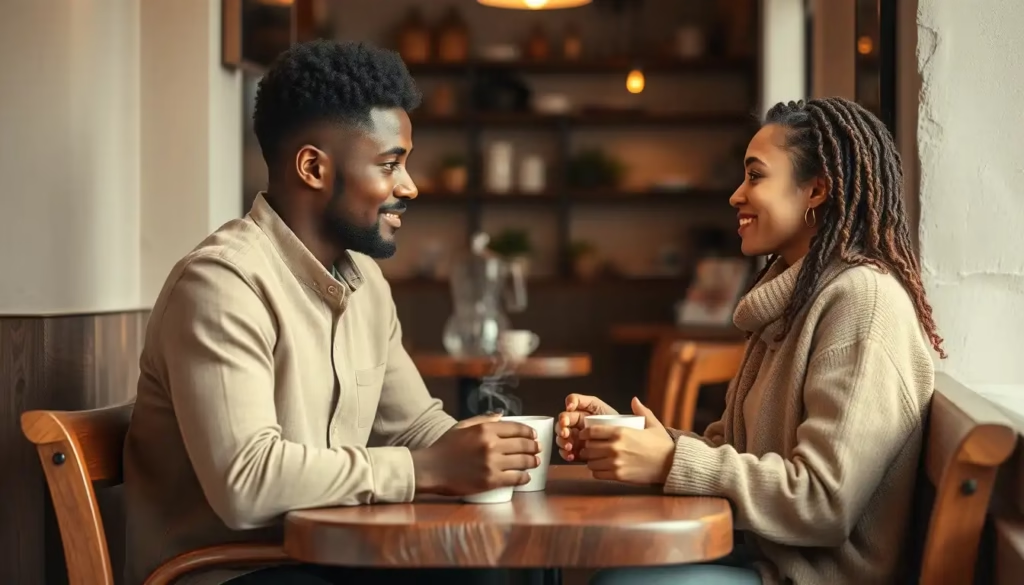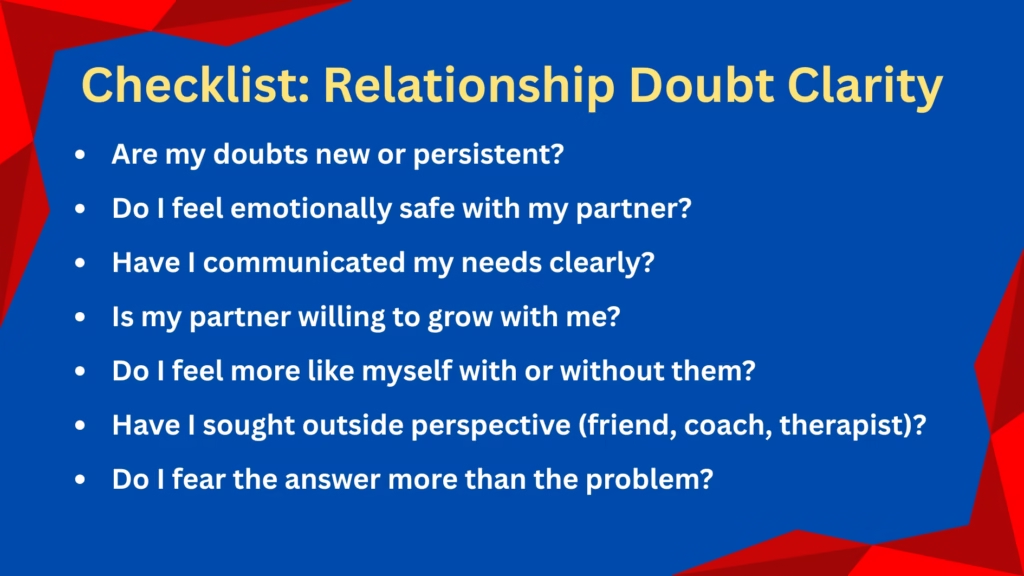Is It Okay to Have Doubts in a Relationship? Yes — And Here’s the Truth You Need to Hear
Yes, to put it succinctly. The lengthy response? What you do with those doubts will determine the outcome. Doubts are not an indication of failure; rather, they are a call to inquiry, comprehension, and occasionally even recovery. Know that you’re not broken if you’re experiencing emotional instability or if questions are keeping you up at night. You’re only a human.

In this sincere manual, we’ll normalize uncertainty and go over six straightforward strategies for introspection, emotional healing, and reconnecting. This article is full of data, real-life examples, expert interviews, and doable strategies to help you go forward—without fear, guilt, or shame—whether you’re engaged, married, or simply dating.
Why Doubts Are Normal but Not Always Harmless
“Doubt is not the opposite of faith. It is an element of faith.” — Paul Tillich
Relationship doubts can come like a whisper or a storm. But here’s what matters most—how you interpret and act on them.
When Doubts Are Healthy:
-
When you’re reassessing compatibility.
-
When you’re evaluating emotional safety.
-
When you’re growing individually and want to bring your partner along.
When Doubts Turn Toxic:
-
When they’re based on unresolved trauma or anxiety.
-
When they stem from manipulation, gaslighting, or abuse.
-
When they’re constant and prevent emotional intimacy.
💔 Case Study: “I Almost Left the Love of My Life”
Emma, a 34-year-old freelance writer from London, once told me,
“I kept wondering: Is it okay to have doubts in a relationship even after three years of being happy? Was I just overthinking?”
Her partner James was kind and supportive, but she began overanalyzing every little thing. Eventually, she realized the doubts weren’t about him—they were about her fear of being vulnerable. After couples therapy, they reconnected deeply. Today, they’re engaged.
Moral: Doubt can be a doorway to emotional depth—if you’re brave enough to walk through it.
6 Honest Ways to Answer: Is It Okay to Have Doubts in a Relationship?
1. Distinguish Fear from Intuition
Sometimes, what feels like a red flag is actually a yellow light asking you to slow down—not stop.
Real-Life Example:
A man in New York City thought he had commitment issues. But therapy revealed he simply feared repeating his parents’ toxic marriage.
Ask Yourself:
-
Are my doubts rooted in past trauma or present behavior?
-
Is this a pattern or a one-off feeling?
2. Talk It Out—But Do It Right
Holding in your doubts often makes them grow. Share them, but not as accusations—as reflections.

-
Use “I feel” instead of “You always.”
-
Start the convo when you’re calm, not during conflict.
Expert Tip:
Dr. Alexandra Solomon, clinical psychologist and author of Loving Bravely, recommends:
“Lead with vulnerability, not blame. Doubt doesn’t mean doom. It’s a signal.”
🔗 Dr. Solomon’s Website for more tools on relational self-awareness.
3. Use Doubts to Deepen Emotional Intimacy
Doubt can be the crack where light gets in. Ask yourself what you’re really seeking—more security? More emotional connection?
Research Insight:
A 2023 study from the Journal of Marriage and Family Therapy found that 63% of couples who worked through doubts together reported higher satisfaction in their relationship within six months.
4. Do a Relationship Self-Audit
Sometimes, it’s not the partner—it’s the pattern. Assess whether your relationship is meeting your core needs.
Relationship Health Table:
| Need Category | Signs It’s Met | Signs It’s Missing |
|---|---|---|
| Emotional Safety | You can be vulnerable without fear | You’re constantly defensive or guarded |
| Communication | You feel heard and understood | Conversations spiral into arguments |
| Shared Values | You align on life goals and priorities | Conflicts over big-picture life choices |
| Growth & Support | You cheer each other on | You feel held back or alone |
5. Step Away to Gain Clarity
Distance—whether a short solo trip or just a weekend away—can help you separate reaction from reality.
Real-Life Example:
Nina, a digital nomad, felt uncertain about her long-distance partner. A week in Bali gave her the space to reflect. Her conclusion? “It wasn’t him. It was my burnout.” They’re still happily together.
6. Ask the Hard Questions—And Answer Them Honestly
If your doubts linger even after reflection and conversation, it’s time for radical honesty.

🌍 Worldwide Voices on Relationship Doubt
📞 Interview Excerpts:
Carlos, 29 (Mexico City):
“My parents never talked about their feelings, so I never learned how to. My girlfriend helps me unlearn that. The doubt came when I thought I wasn’t enough.”
Amrita, 41 (Delhi):
“I doubted my husband after 10 years of marriage. Therapy showed me it wasn’t the marriage—it was the part of me I lost to motherhood. We’re rebuilding.”
💬 Expert Insight
Dr. Stan Tatkin, founder of the PACT Institute, says:
“Doubt often emerges when partners don’t feel safe. Emotional safety isn’t optional—it’s foundational.”
🔗 PACT Institute
Final Thoughts: Embrace the Doubt—Don’t Fear It
Is it okay to have doubts in a relationship? Yes. What’s not okay is ignoring them.
Doubt does not imply failure. It indicates that you’re listening. Run toward the solutions rather than away from the questions. Doubt can develop into the purest form of trust if it is treated with integrity and consideration.
🌟 Special Advice Just for You
If you’re drowning in relationship uncertainty, try this: Write your future self a letter. Describe your ideal relationship. Then ask—does your current one reflect that? If not, you don’t need to panic. You just need to pivot.
📢 Call to Action
✨ Found this helpful? Don’t keep it to yourself. Share it with someone who might be silently battling their doubts.
💌 Join our newsletter for weekly emotional tools, couples activities, and expert Q&A sessions.
❓FAQs : Is it Okay to Have Doubts in a Relationship
Q1.Is it okay to have doubts in a long-term relationship?
Yes. Even solid relationships experience moments of uncertainty, especially during transitions like moving in, parenting, or career shifts.
Q2.Are doubts a sign I should break up?
Not necessarily. Doubts signal a need for reflection. If they persist despite effort and communication, then consider re-evaluation.
Q3.How can I tell the difference between a red flag and normal doubt?
Red flags involve harm, manipulation, or violation of boundaries. Doubt can be emotional confusion or misalignment, not abuse.
Q4.Should I tell my partner about my doubts?
Yes—but kindly and thoughtfully. Approach with honesty, not blame.
Q5.Can therapy help with relationship doubts?
Absolutely. Therapists can help you unpack fear, clarify needs, and develop better communication.
Q6.What if I have doubts but my partner doesn’t?
That’s okay. Everyone processes differently. The key is open dialogue, not matching emotional timing.
Q7.Are doubts more common in certain types of relationships?
Yes. Long-distance, trauma-informed, or first-love relationships may trigger more frequent doubts.
Q8.Should I wait for clarity or take action now?
Clarity often comes through action—conversation, space, or therapy. Waiting passively rarely helps.
Q9.What if my doubts stem from anxiety?
Identify the source with help from a mental health professional. Sometimes anxiety mimics relationship fear.
Q10.How do I stop overthinking?
Mindfulness, journaling, and cognitive behavioral therapy (CBT) techniques can ground you in reality rather than fear.
Useful Articles :-
- Signs of Love Bombing: 7 Red Flags to Spot Manipulative Affection Early
- What Is a Situationship? 7 Unfiltered Truths About Modern Love
- 10 Signs of a Healthy Relationship: What To Look For
- Communication Skills for Couples: 7 Transformative Tips to Strengthen Your Connection
- 7 Powerful Ways to Build Healthy Relationship Boundaries for Lasting Love
- 9 Empowering Steps for Recovering from a Breakup: Heal, Grow, and Thrive
- 7 Powerful Long-Distance Relationship Advice : Tips to Keep the Spark Alive
- Jealousy in Relationships: 7 Powerful Ways to Manage the Green-Eyed Monster
- 5 Insights Into Love Languages in Relationships : Do They Really Work?
- What Does Emotional Safety In Relationships? 7 Biblical Keys to Building Trust and Intimacy